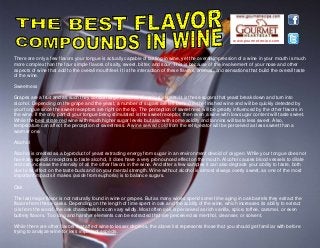
The best flavor compounds in wine
- 1. www.gourmetrecipe.com There are only a few flavors your tongue is actually capable of tasting in wine, yet the overall impression of a wine in your mouth is much more complex than the four simple flavors of salty, sweet, bitter, and sour. This is because of the involvement of your nose and other aspects of wine that add to the overall mouthfeel. It is the interaction of these flavors, aromas, and sensations that build the overall taste of the wine. Sweetness Grapes are a fruit and as such they contain large amounts of various sugars. It is these sugars that yeast break down and turn into alcohol. Depending on the grape and the yeast, a number of sugars are left behind in the finished wine and will be quickly detected by your tongue since the sweet receptors are right on the tip. The perception of sweetness will be greatly influenced by the other flavors in the wine. If the only part of your tongue being stimulated is the sweet receptor, then even a wine with low sugar content will taste sweet. While the best strate red wine with much higher sugar levels but also with some acidity and tannins will taste less sweet. Also, temperature can affect the perception of sweetness. A wine served cold from the refrigerator will be perceived as less sweet than a warmer one. Alcohol Alcohol is created as a byproduct of yeast extracting energy from sugar in an environment devoid of oxygen. While your tongue does not have any specific receptors to taste alcohol, it does have a very pronounced effect on the mouth. Alcohol causes blood vessels to dilate and can increase the intensity of all the other flavors in the wine. And after a few samples it can also degrade your ability to taste, both due to its effect on the taste buds and on your mental strength. Wine without alcohol is almost always overly sweet, as one of the most important impacts it makes (aside from euphoria) is to balance sugars. Oak The last major flavor is not naturally found in wine or grapes. But as many wines spend some time aging in oak barrels they extract the flavors from these casks. Depending on the length of time spent in oak and the acidity of the wine, which increases its ability to extract oils from the wood, the oak characteristics can vary wildly. Most often oak is perceived as rich vanilla, spice, toffee, caramel, or even buttery flavors. Too long and harsher elements can be extracted that are perceived as menthol, cleanser, or solvent. While there are other flavors that affect wine to lesser degrees, the above list represents those that you should get familiar with before trying to analyze wine for less important aspects.
